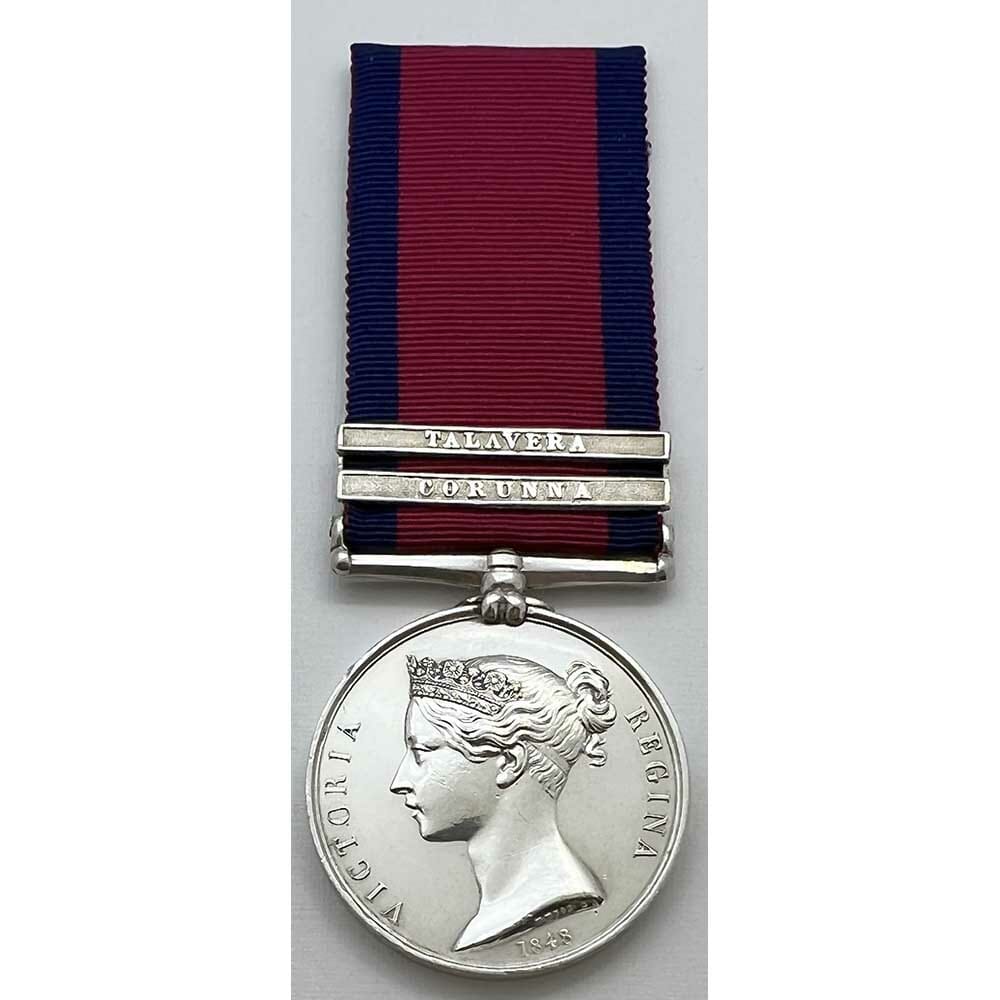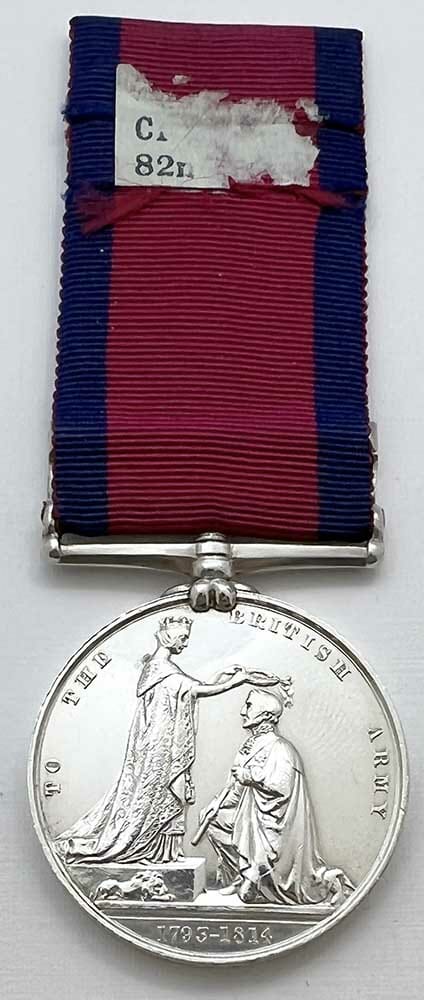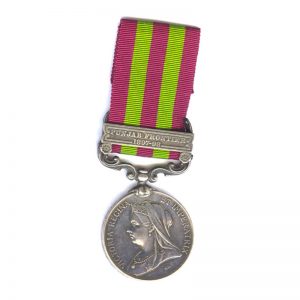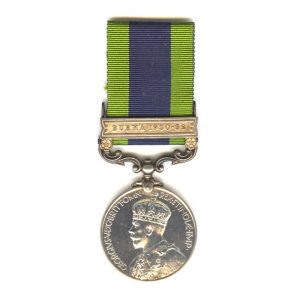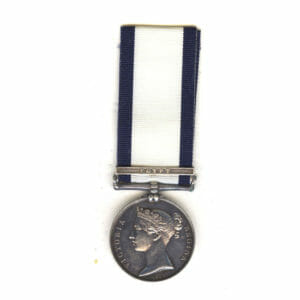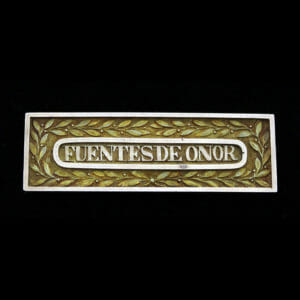Description
Military General Service Medal, 2 bars, Corunna, Talavera, Joseph Crowther, 82nd Regiment of Foot, the Prince of Wales’ Volunteers later becoming the South Lancashire Regiment during 1881, a unique combination to the regiment.
Officially impressed: “Joseph Crowther, 82nd Foot” Only slight general wear, excellent preserved condition.
For their service in the Peninsular Wars, only 219 medals were claimed by men of the 82nd Foot, of which 7 men would be present at both Corunna and Talavera, Joseph Crowther was the only man to receive a medal with only these 2 clasps.
Provenance: Ex Glendinings February 1980 and December 1990.
Joseph Crowther was born circa 1787 in Kingsburne, Stockbridge, Hampshire.
He first attested for service on 20th April 1805 at the age of 18.
He saw long service until 1821, serving 10 years 2343 as a Private and 6 years as Corporal, totalling 16 years 243 days of service.
His service was finally ended on 18th December 1821 due to swelling and ulcer of his left leg.
An excerpt of his service from the Lancashire Infantry Museum’s website:
https://www.lancashireinfantrymuseum.org.uk/the-82nd-prince-of-waless-volunteers-regiment/
Since he was serving at the time, it is likely he also took part in the invasion of Copenhagen during 1807 (Not to be confused with the earlier one in 1801 where the Battle Honour was earned)
“1807 – Attack on neutral Denmark
By 1807, Napoleon had – temporarily – defeated Russia, broken Prussia, and subdued Austria and Sweden. It only remained to defeat Britain. To gather enough ships for an invasion, he planned to force Denmark and Portugal to hand over their fleets to French service. The British, unsurprisingly, had no intention of allowing him to succeed.
In 1801, Vice-Admiral Lord Nelson had attacked the Danish fleet at Copenhagen after the Danes conceded to “armed neutrality” against British trade. Now once again, the British intended to attack Copenhagen unless the neutral Danes agreed to anchor their fleet in British ports until the end of the war. As expected, they refused.
So in July 1807, 27,000 troops, including German regiments in British pay, set sail for Denmark in 442 ships. The 82nd Regiment was landed at Warbeck north of Copenhagen on 15 August. Copenhagen was bombarded and the defenders capitulated on 6th September. British casualties were light – 10 killed, 178 wounded – but the 82nd was the hardest hit battalion with five dead and 19 wounded. There were some 400 Danish military casualties and 1,500 civilians died.
Under the capitulation terms, the British occupied the Citadel of Copenhagen and commandeered 33 Danish warships and naval stores and arsenals. After releasing prisoners of war, they sailed home October.
The 82nd had distinguished themselves in action, and their commanding officer earned a knighthood. They returned to acclaim in England that Napoleon’s invasion plans had been set back, but recriminations abroad about the doubtful legality of the attack on a neutral country. No battle-honour was granted for the expedition, unlike in 1801 when two regiments were awarded the Naval honour “Copenhagen”. “
“1808- 1809 North Spain – The Terrible Retreat to Corunna
In Lisbon, Wellesley was replaced in October by Lieutenant General Sir John Moore. Moore marched east with 20,000 troops to help the Spanish. Napoleon had crossed the Pyrenees, defeated several Spanish armies and again occupied Madrid. With 80,000 troops, the Emperor now moved to trap and destroy Britain’s small army. Lt Gen Moore abandoned his own plans and, on 28 November, he began to retreat across the barren, freezing mountains towards the port of Corunna, 300 miles away. During the long, demoralising retreat, discipline broke down in many regiments and a rabble of an army eventually straggled into Corunna, where it destroyed its own stores and many horses and waited for rescue by the Royal Navy. Napoleon returned to Paris and left his generals to complete the British army’s destruction.
Sir John Moore hoped to save his army without a fight and, on 16 January 1809, he was within a day of sailing when the French attacked Corunna. Outnumbered, the ragged British battalions drove off the French for long enough to get more than 20,000 men embarked for home. Sir John Moore was not with them. Mortally wounded, he was one of 800 British dead buried at Corunna. Many sick were also left behind. The 82nd Regiment, defending the western road to the town gates, had no part to play in the battle although it had lost 228 casualties already and had left dozens of sick men in Lisbon. Spanish troops fought until the British were safely at sea before they surrendered Corunna to the French.
At home, the shocking defeat in Spain and the pitiful state of the returning soldiers caused a public outcry. Sir John Moore had been badly defeated but he had at least saved Britain’s only army to fight again and had diverted Napoleon from the conquest of Portugal, however uneasy the small British force that remained in Lisbon.
1809 – Spain – A Small Part at Talavera.
In April 1809, Lt Gen Sir Arthur Wellesley was ordered back to Lisbon to command an army of 20,000, including German regiments. The army crossed into Spain and won a grim defensive victory at Talavera on 27 July 1809. Outnumbered two to one, the British suffered over 5000 casualties and were forced to retreat the next day. Two officers and 64 men from the 82nd who had been left sick in Lisbon fought with a makeshift “Battalion of Detachments”; five were casualties. By December, the British were back in Lisbon and on the defensive. Wellesley was made Viscount Wellington of Talavera.
